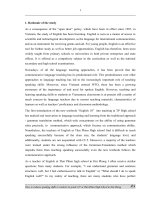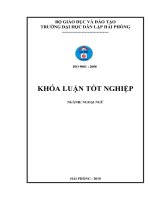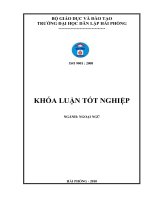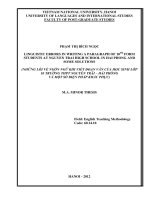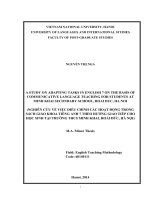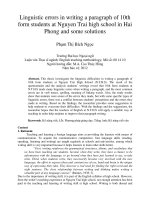Suggestions on techniques to learn vocabulary for students at Quang Trung secondary school in Hai Phong
Bạn đang xem bản rút gọn của tài liệu. Xem và tải ngay bản đầy đủ của tài liệu tại đây (1.11 MB, 66 trang )
BỘ GIÁO DỤC VÀ ĐÀO TẠO
TRƯỜNG ĐẠI HỌC DÂN LẬP HẢI PHÒNG
-------------------------------
ISO 9001 : 2008
KHÓA LUẬN TỐT NGHIỆP
NGÀNH: NGOẠI NGỮ
HẢI PHÒNG - 2010
HAIPHONG PRIVATE UNIVESITY
FOREIGN LANGUAGES DEPARTMENT
-----------------------------------
GRADUATION PAPER
SUGGESTIONS ON TECHNIQUES TO LEARN
VOCABULARY FOR STUDENTS IN
QUANG TRUNG SECONDARY IN HAIPHONG
By:
DƯƠNG THU THỦY
Class:
NA1004
Supervisor:
NGUYỄN THỊ HUYỀN, M.A
HAI PHONG - 2010
BỘ GIÁO DỤC VÀ ĐÀO TẠO
TRƯỜNG ĐẠI HỌC DÂN LẬP HẢI PHÒNG
--------------------------------------
Nhiệm vụ đề tài tốt nghiệp
Sinh viên: ............................................................Mã số: ............................
Lớp: .............................Ngành:....................................................................
Tên đề tài: .................................................................................................
..................................................................................................
.................................................................................................
..................................................................................................
Nhiệm vụ đề tài
1. Nội dung và các yêu cầu cần giải quyết trong nhiệm vụ đề tài tốt nghiệp
( về lý luận, thực tiễn, các số liệu cần tính toán và các bản vẽ).
……………………………………………………………………………..
……………………………………………………………………………..
……………………………………………………………………………..
……………………………………………………………………………..
……………………………………………………………………………..
……………………………………………………………………………..
……………………………………………………………………………..
……………………………………………………………………………..
2. Các số liệu cần thiết để thiết kế, tính toán.
……………………………………………………………………………..
……………………………………………………………………………..
……………………………………………………………………………..
……………………………………………………………………………..
……………………………………………………………………………..
……………………………………………………………………………..
……………………………………………………………………………..
……………………………………………………………………………..
……………………………………………………………………………..
3. Địa điểm thực tập tốt nghiệp.
……………………………………………………………………………..
……………………………………………………………………………..
……………………………………………………………………………..
CÁN BỘ HƯỚNG DẪN ĐỀ TÀI
Người hướng dẫn thứ nhất:
Họ và tên: .............................................................................................
Học hàm, học vị: ...................................................................................
Cơ quan công tác:.................................................................................
Nội dung hướng dẫn:............................................................................
Người hướng dẫn thứ hai:
Họ và tên:.............................................................................................
Học hàm, học vị:...................................................................................
Cơ quan công tác:.................................................................................
Nội dung hướng dẫn:............................................................................
Đề tài tốt nghiệp được giao ngày 12 tháng 04 năm 2010
Yêu cầu phải hoàn thành xong trước ngày 10 tháng 07 năm 2010
Đã nhận nhiệm vụ ĐTTN
Sinh viên
Đã giao nhiệm vụ ĐTTN
Người hướng dẫn
Hải Phòng, ngày tháng năm 2010
HIỆU TRƯỞNG
GS.TS.NGƯT Trần Hữu Nghị
PHẦN NHẬN XÉT TÓM TẮT CỦA CÁN BỘ HƯỚNG DẪN
1. Tinh thần thái độ của sinh viên trong quá trình làm đề tài tốt nghiệp:
……………………………………………………………………………..
……………………………………………………………………………..
……………………………………………………………………………..
……………………………………………………………………………..
……………………………………………………………………………..
……………………………………………………………………………..
……………………………………………………………………………..
……………………………………………………………………………..
2. Đánh giá chất lượng của khóa luận (so với nội dung yêu cầu đã đề ra trong
nhiệm vụ Đ.T. T.N trên các mặt lý luận, thực tiễn, tính toán số liệu…):
……………………………………………………………………………..
……………………………………………………………………………..
……………………………………………………………………………..
……………………………………………………………………………..
……………………………………………………………………………..
……………………………………………………………………………..
……………………………………………………………………………..
……………………………………………………………………………..
……………………………………………………………………………..
3. Cho điểm của cán bộ hướng dẫn (ghi bằng cả số và chữ):
……………………………………………………………………………..
……………………………………………………………………………..
……………………………………………………………………………..
Hải Phòng, ngày ….. tháng ..… năm 2010
Cán bộ hướng dẫn
(họ tên và chữ ký)
NHẬN XÉT ĐÁNH GIÁ
CỦA NGƯỜI CHẤM PHẢN BIỆN ĐỀ TÀI TỐT NGHIỆP
1. Đánh giá chất lượng đề tài tốt nghiệp về các mặt thu thập và phân tích tài liệu,
số liệu ban đầu, giá trị lí luận và thực tiễn của đề tài.
2. Cho điểm của người chấm phản biện :
(Điểm ghi bằng số và chữ)
Ngày.......... tháng......... năm 2010
Người chấm phản biện
TABLE OF CONTENTS
ACKNOWLEDGEMENT
TABLE OF CONTENTS
PART I: INTRODUCTION
1. Rationale
2. Aims of the study
3. Scope of the study
4. Method of the study
5. Design of the study
PART II: DEVELOPMENT
Chapter I: THEORETICAL BACKGROUND
I. Vocabulary
1. Definitions
2. Classification of vocabulary
2.1. Reading vocabulary
2.2. Listening vocabulary
2.3. Writing vocabulary
2.4. Speaking vocabulary
3. Vocabulary importance
II. Vocabulary study
1. What need to be studied
1.1 Meaning
1.2 Form
a. Spelling
b. Pronunciation
a. Orthography word formation
b. Some equivalent concept
c. Ways of word formation
1.4 Grammar
2. Vocabulary study
2.1 Studying from textbook
2.2 Study from dictionary
2.3 Studying from English songs
2.4 Study from idioms and phrases
2.5 Studying from mass media
2.6 Studying from listening and speaking
2.7 Studying from reading and writing
2.8 Studying from integrated skills containing reading, writing, speaking and
listening skills
2.9 Studying from pair work and group work
3. Vocabulary learning tips
Chapter II: A STUDY ON THE STUDENTS’S LEARNING VOCABULARY
IN QUANG TRUNG SECONDARY SCHOOL
I. The reality of learning English at high school
1. Teaching staff
2. Students
3. English teaching and learning condition
II. Survey questionnaire
1. Objective of the survey
2. Design of the survey
3. Data and analysis
3.1 Students’ opinions on what they have obtained after learning vocabulary
lessons
3.2 Problems often faced by students when learning vocabulary.
3.3 Students’ normally used techniques to study vocabulary.
3.4 Students’ points of view on the effectiveness of their learning vocabulary.
3.5 Students’ expectation toward learning English vocabulary.
III. Findings and discussion of findings
Chapter III: SOME SUGGESTED TECHNIQUES TO STUDY ENGLISH
VOCABULARY FOR THE STUDENTS IN QUANG TRUNG SECONDARY
SCHOOL
1. Introduction
2. Studying English vocabulary from picture
2.1. Words accompanied with pictures
2.2. Matching
3. Studying English vocabulary through the funny games
3.1. Jumble words
3.2. Word search game
3.3.” Crossword” game
3.4. Matching game
4. Studying English vocabulary through mass media
4.1. Using books, magazines, newspapers
4.2 Watching films with English subtitles
5. Studying English vocabulary from Internet
6. Studying English vocabulary from Synonyms and Antonyms
7. Studying English vocabulary via books
PART III: CONCLUSION
APPENDIX
LIST OF REFERENCES
ACKNOWLEDGEMENTS
First of all, I would like to express my deepest thanks to Mrs, Nguyen Thi Huyen,
M.A – my supervisor. A person of varied skills and experience in English teaching,
she has eased my research through valuable suggestion, careful and detailed
comments. Without her help this paper will never be completed.
I wish also to express my great thanks to Dr. Tran Thi Ngoc Lien – the Dean of
foreign language department of Hai Phong Private University, and other kind
hearted teachers of English, for their concern and support during the time I am
studying here.
My gratitude also goes to the class NA 1004, for their continuing support and
sharing their ideas with me both as classmate and friends and for the wonderful
time we had in Hai Phong Private University.
I also would like to express my deepest thanks to English teachers and all students
at Quang Trung secondary school in Hai Phong for their help that I would
completed my research.
Last but not least, I thank my mother and my father who have no knowledge of
English but their help, support and encouragement to my English study is
uncountable, through my life, they have been and still are ever ready to assist and
stay beside me. For which I am truly grateful.
Hai Phong, June, 2010
Duong Thi Thu Thuy
PART I: INTRODUCTION
1. Rationale
Each nation has their own language, custom and culture. To have a common voice,
all nations in the world need have a common language and English is such a
language. Nowadays, English is very important because it has become an effective
medium and is used widen in many fields of life such as science, technology,
foreign trade, tourism business, education and so on...
In Vietnam, since the implementation of the open door – policy, it is now a great
demand to learn English for the process of integrating into regional and
international economic and diplomatic development. Studying English, students
have chances to know many interesting things around the world. However, it is not
easy work because English is very variety and complex.
English learners, especially the secondary students have to face up with many
difficulties such as vocabulary, pronunciation, grammar in which vocabulary is the
most difficult problem. Almost students have difficulties in studying vocabulary at
first. In fact, studying vocabulary well is one of the keys, which help learners step
by step discover this interesting language. To the beginners, vocabulary is the most
important factor, plays an important role in integrating four basic skills such as
listening, speaking, reading and writing. In order to use English as an effective tool
in communication, students have to equip an adequate number of words and should
know how to apply them accurately in each real situation. The more vocabulary we
have, the more confident we are.
However, students can not avoid forgetting vocabulary in the process of studying
English. It is really one of the biggest in learning English. Moreover, students have
to face up with its form, pronunciation and meaning because of its variety and
complication. In fact, a word may have more than one meaning and more than one
part of speech. For example, “study” may be a noun and a verb also. Some words
with different spelling and meaning have the same pronunciation, such as “sun”
and “son”.
Due to my English knowledge limitation and the frame of graduation paper, I make
a sketchy presentation on some effective methods of studying vocabulary with the
hope that this can help the students in Quang Trung secondary school. In the future
time, they will study English for specific purpose which reqires lots of vocabulary.
From the above reasons, I would like to choose the research title “Suggestions on
techniques to learn vocabulary for students in Quang Trung secondary school” to
help the mentioned students as well as others enrich their English vocabulary.
2. Aims of the study
With the hope of helping the students in Quang Trung secondary school make
progress in studying vocabulary. My graduation is about to help the students
improve their own vocabulary and to prepare for them to the basic knowledge of
vocabulary with higher requirement for the next grades. To summarize the above,
my study is aimed at:
Cover background knowledge of vocabulary.
Find out reality of teaching and learning English at Quang Trung secondary school.
Find out appropriate techniques for learning vocabulary which students’ attention.
The students will feel interested, enjoyable and funny when they learn English
vocabulary.
Hopefully, students will be interested in learning English, especially English
vocabulary and get better results.
3. Scope of the study
In fact, there are various techniques to study English vocabulary. However, due to
my limitation of knowledge and time, I have no ambition to study all techniques.
In my graduation paper, I mainly focus on studying some effective techniques in
learning English vocabulary for the students in Quang Trung secondary school (in
HP)
4. Methods of the study
To complete this graduation paper, a series of methods have been applied:
Collected references, books and websites related to vocabulary and techniques to
study English were analyzed in details to form the theoretical background of this
paper.
A survey questionnaire is conducted for students and teachers at Quang Trung
secondary school in Hai Phong, the information from which has provided
invaluably.
5. Design of the study
The study is divided into 3 main parts:
PART I is INTRODUCTION in which rationale, aims, scopes, methods and
design of the study are presented.
PART II named DEVELOPMENT which consists of three chapters:
Chapter I: “Theoretical Background”, presents the background knowledge of
English vocabulary and tips to study English vocabulary.
Chapter II: “A study on the students’ learning vocabulary in Quang Trung
secondary school” deals with the reality of learning, survey, findings and
discussion.
Chapter III refers to “Some suggested techniques to study English vocabulary
for students in Quang Trung secondary school” that can help students make
progress in studying English vocabulary.
PART III is CONCLUSION which summaries the whole study mentioned in the
previous parts.
Briefly, this study consists of three main parts the first is Introduction, the second
is Development and the last part is Conclusion, of which the second is the very
important part.
PART II: THE STUDY
CHAPTER I: THEORETICAL BACKGROUND
I. Vocabulary
1. Definitions
Vocabulary has been defined variously. Here are some main definitions of
vocabulary:
According to Richard, Platt (1992), vocabulary is “a set of lexemes, including
single words, compound words and idioms.”(p. 40). Whereas, the Advanced
Learner’s Dictionary (1995:1331) offered its own definition. Vocabulary here is
simply understood as “the total number of words in a language.”
Another definition was given by Penny Ur (1996) in which vocabulary could be
understood as all the words taught in the foreign language. Furthermore, from his
point of view, vocabulary “may be more than a single word” such as post-office or
mother-in-law. Meanwhile, another definition found in the website:
www.en.wikipedia.org that “A vocabulary is a set of words known to a person or
other entity, or that are part of a specific language”.
Lewis and Hill (1985) also shared Ur’s idea in that he considered a vocabulary
item more than one word. They also mentioned a temptation to think that the core
of learning a foreign language was to use words for old things. However, in fact, it
was more complicated than that.
Nguyen Bang and Nguyen Ba Hoc (2002) considered their following definition of
vocabulary as “logical”. According to them, when the term “vocabulary” of a
language was mentioned, it should be mentioned as consisting of all the words,
compounds and idioms used to transmit information on both “oral and written
communication”.
In conclusion, it is easy to see that there are many ways to define vocabulary. The
way that linguists choose to define vocabulary depends on the way he assesses the
importance of the components of each language. Of all the above definitions, the
one that Richard and Platt (1992) proposes in the Dictionary of language teaching
and applied linguistics is perhaps one of the most widely-accepted definitions since
it given us the whole scope of vocabulary.
2. Classification of vocabulary
Vocabulary is knowledge of words and word meanings. However, vocabulary is
more complex than this definition suggests. Words come in two forms: oral and
print. Oral vocabulary includes those words that we recognize and use in listening
and speaking. Print vocabulary includes those words that we recognize and use in
reading and writing (Kamil & Hiebert, in press).
2.1 Reading vocabulary
A person's reading vocabulary is all the words he or she can recognize when
reading. This is the largest type of vocabulary simply because it includes the other
three.
Reading vocabulary is made of the words in print that we recognize or can figure
out.
If you are reading the book that deals with a scientific subject, the definition of
various terms should be noted in that book. If you are reading a fiction book, and
uncommon term is used, a definition of that term should be listed. Placing the
words within the text increases the chances that the word will be retained.
2.2 Listening vocabulary
A person's listening vocabulary is all the words he or she can recognize when
listening to speech. This vocabulary is aided in size by context and tone of voice.
Listening vocabulary refers to the words we need to know to understand what we
hear.
2.3 Writing vocabulary
A person's writing vocabulary is all the words he or she can employ in writing.
Contrary to the previous two vocabulary types, the writing vocabulary is
stimulated by its user.
We expect that this writing should also enable students to use the vocabulary they
have studied in a realistic context, and that they could be motivated to learn even
more vocabulary they need to accomplish the task.
2.4 Speaking vocabulary
A person's speaking vocabulary is all the words he or she can use in speech. Due to
the spontaneous nature of the speaking vocabulary, words are often misused. This
misuse – though slight and unintentional – may be compensated by facial
expressions, tone of voice, or hand gestures.
3. Vocabulary importance
Of many components of one language, vocabulary has been commonly accepted to
be the most important language one. Commenting on the role of vocabulary,
Wilkins (1982), a famous British linguist said: “without grammar, very little can
be conveyed, without vocabulary, nothing can be conveyed”. (Cited in A course in
TEFL – Theory and Practice II by Nguyen Bang and Nguyen Ba Hoc (2002:35)).
People consider vocabulary as the key to master English knowledge. With the lack
of vocabulary, it is difficult to communicate with other people confidently.
Moreover, it is hard to express idea and explain something necessary. Therefore,
on a personal level, a good vocabulary is important in sharpening one’s perception
thought and perception, to become fully conscious, must be formulated in words.
A good vocabulary is important not only for more precision in thought but also in
one’s daily affairs, the action one must perform both on and off the job in ordinary
living.
Vocabulary plays an important role in combining four basis English skills such as
listening, speaking, reading and writing. When having a multiform vocabulary, it is
extremely advantageous to develop four above skills. If we lack of necessary
vocabulary, it will be difficult to express any ideas to others. Therefore, our
speaking skill can not make any progress. Moreover, sometimes it makes
confusion among people and leads to many inconvenient situations. Additionally,
if it is supposed that you have a poor vocabulary, how can you write a lively and
excellent essay or normal paragraphs? Truly, it requires a great number of
vocabulary. Normally, we also can get information from reading books. If books
are Vietnamese certainly these are not any problems. However, these books are
written in English and denoted in English style. If you do not have a good
dictionary, it will take you lots of time to understand. We have to understand what
we have learned to use vocabulary in each situation effectively. Frequently reading
comprehensions, and thus retention, are faulty because of a learner’s less than
adequate vocabulary. With the lack of vocabulary, it is difficult to communicate
with other people confidently. Moreover, it is easy to have misunderstanding in the
process of exchanging information. It is hard to express ideas and explain
something necessary. Only when having a great number of vocabulary can we
make a progress in developing 4 above skills. In communication, it is a decisive
factor to make us talk with others actively and understanding each other quickly.
With a poor vocabulary, the free flow of ideas and pen is blocked and dribbles out;
with a good vocabulary, it will be helped to flow, unimpeded.
II.
Vocabulary study
1. What need to be studied
It requires you to spend a lot of time on studying vocabulary. Because studying
vocabulary is a long process with the practice of many aspects such as mastering
the meaning, form and word formation and grammar. Only when we spend much
time practising these can we make progress in English vocabulary study.
1.1. Meaning
The first thing to realize about vocabulary items is that they frequently have more
than one meaning, so when you learn a new word you should decipher its meaning
in the context in which it is used. Another fact about meaning is that sometimes
words have meaning in relation o other words. Thus, you need to know the
meaning of “animal” word to describe anyone of a number of other things, eg:
elephant, peacock, penguin, dragonfly…ect. “Animal” has a general meaning
whereas “elephant” is more specific. We understand the meaning of the word like
“good” in the context of word like “bad”. Words have opposites (antonyms) and
they also have other words with similar meaning (synonyms) eg: “bad” and “evil”.
Even in that example, however, one thing is clear: words seldom have absolute
synonyms although context may take them synonyms on particular occasions. As
far meaning goes, then, you need to know about meaning in context and you need
to know about sense relations.
1.2 Form
a. Spelling
Spelling is the writing of word or words with all necessary letters and diacritics
present in an accepted standard order. It is one of the elements of orthography and
a prescriptive element of language. Most spellings attempt to approximate a
transcribing of the sounds of the language into alphabetic letter: however,
completely phonetic spellings are often the exception, due to drifts in
pronunciations over time and irregular spellings adopted common usage.
b. Pronunciation
Pronunciation plays an important part in making listeners understand what we are
speaking about. Therefore, it is extremely important in the process of learning
English vocabulary. However, it is not easy to pronounce an English vocabulary to
learn from dictionary, from daily conversations among different people, from news
on internet, radio, television…You should pay attention to the stress and
intonation. However, if you make too many mistakes in pronouncing English
vocabulary, it may makes listeners confused and lead to a wrong information
transmission.
1.3 Word formation
1.3.1. Some equivalent concepts
Hoang Tat Truong said that: “Word formation is the process of building of new
words from the material already existing in the language according to certain
structural and semantic patters and formulate”.
The subject mater of word formation is of course not simple words but the one that
are analyzable structurally and semantically, i.e derived and compound words.
Thus, word formation goes into such word as “learner mouthy”, “baby-sister” but
not “learn mouth”, “baby” and “sit”.
In linguistics, word formation is the creation of a word. Word formation is
sometimes contrasted with semantic change, which is a change in a single word’s
meaning. Word formation can also be contrasted with the formation of idiomatic
expressions.
Conventionally, a combination of two or more words that function as a single unit
of meaning such as barefoot. Word whose component part as themselves words or
combined forms (Adapted from IS04: 1984).
1.3.2. Ways of word formation
The following are the various principal ways of word formation in English grade
according to their productive degrees. Two major ways are:
(1) Affixation
(2) Compounding
Affixation is the formation of new words with the help of affixes.
Affixies consists of prefixes and suffixies; therefore affixation is divided into
prefixation and suffixation. For example: dislike, inconvenient, approval, unstable.
Besides, these other ways, namely
(1) Shortening
(2) Conversion
(3) Sound imitation
(4) Sound and stress interchange
(5) Words from name
(6) Back derivation
However, aside from merely expanding the lexicon with new word, formation
experts have recognized two types of word formation rules, that is:
(1) Lexical derivation
(2) Compounding
In terms of lexical derivation, the use of morphemes and other functions can be
described as functional derivation transposition, category adjustment and effective
derivations. Functional lexical derivations insert a grammatical category function.
Compounding (word – composition) is the building of a new word by joining two
or more words. A compound word that consists of at least two root morphemes: It
is clear that the components of a compound may be either simple or derived words
or even other compounds. Compound can function in a sentence as separate lexical
units due to their integrity, semantic unity and so on.
In general, English compounds have two stems. The second element usually
expresses a general meaning. In the examples above, boy, keeper, carrier etc
express a general meaning thus being the basic part in the compound. This basic is
called “determinatum” the first part, being the determing ones, is called
“determinant”.
1.4 Grammar
The grammar of a new item will need to be studied if this is not obviously covered
by general grammatical rules. An item may have an unpredictable change of form
in certain grammatical contexts or may give some idiosyncratic ways of connecting
with other words in sentences; it is important to provide learners with this
information at the same as we study the base form. When studying a new verb, for
example, we might give also its past form, if this is irregular (buy – bought), and
we might note if it is transitive of intransitive. Similarly, when studying a noun, we
may wish to present its plural form, if irregular (mouse – mice), or draw learners’
attention to the fact that is has no plural at all (happiness, information). We may
present verb such as want and enjoy together with the verb form that follows them
(want to, enjoy), or adjective or verbs together with their following prepositions
(interesting in, accuse somebody of).
2. Vocabulary study
Normally, there are lots of different of vocabulary denoted all aspects of life. It has
been widely said that nowadays, number of vocabulary is increasing very quickly
day by day, year by year. For example, the appearance of brand new words likes
“blog”, “bogger”…in accordance with the internet’s development. According to
the aims, each person has own choice to study vocabulary which is suitable to the
occupation. At present, learning vocabulary can be easily carried out from many
ways. We can learn English everywhere with the support of many resources. These
are really advantages for us to make use of applying them to enhance our English
knowledge, especially English vocabulary. Here are some popular ways which
help you improve your vocabulary effectively:
2.1 Studying from textbooks
The English textbooks like a source supplying the available new words. You are
taught English vocabulary according to the arranged topics and the new words also
are arranged systematically due to each lesson. Therefore, learning vocabulary
from textbooks makes you pay attention to the lesson and easy to remember new
words. Normally, you are taught English vocabulary according to the arranged
topics such as shopping, travel, family…ect with related vocabulary. For example,
with the topic “shopping” you may learn and remember some main words such as
“bargain, sale off, discount, expensive…ect”. With the topic “family” it is
necessary to remember words “generation, niece, grandparents, family tree”…ect.
Obviously, when studying English vocabulary in group, it will be easy to
memorize. A part from, doing as many exercises as possible and studying English
vocabulary in group are also a good idea. It will help students review lessons and
consolidate the knowledge. So, it is a good technique to learn English vocabulary.
Sometimes, you can exchange the results with your friends to compare and unify to
the best one. If you make mistakes, your friends will show you and remind you to
do it again.
2.2. Studying from dictionary
This is the most common way when studying a certain foreign language, especially
English. Searching a new word in dictionary makes you know the part of speech,
the usage, the meaning and the pronunciation as well. Importantly, you see the
detail examples to know how to apply that word in each situation. Sometimes, you
have experiences in avoiding using words in some cases to be not misunderstood.
For example, if you want to search the word “pollution”, you find it in your
dictionary alphabetically. After that you will know its pronunciation /p∂'lu:∫n/; the
part of speech is a noun. Its meaning is denoted like this “sự ô nhiễm, sự làm ô uế,
sự làm mất thiêng liêng – sự ô nhiễm, sự làm nhơ bẩn (nước…); chất làm ô nhiễm,
chất làm nhơ bẩn – sự đầu độc, sự làm hư hỏng, sự làm sa đọa”. Besides, we know
more about its verb – “to pollute” with the meaning “làm ô nhiễm, làm nhơ bẩn
(nước…). Therefore, we know how to distinguish between a noun and a verb and
use these words in a concrete situation.
It is advisable to use English Study software to learn English, especially English
vocabulary. This is English studying software published by LCKSOFT software
joint stock Company. This software helps you to learn listening skill with
Headway, Here and There and streamline. Moreover it provides some useful
programs such as ABC Grammar, Grammar in use, Reading Practice, Writing
Assistant, Vocabulary Study and Crossword Game. These sections not only supply
us to relax ourselves. Especially, with 7 different dictionaries, this software allows
you to search and learn English vocabulary effectively. English- Vietnamese
dictionary containing 140.000 news words with about 2000 illustrations allowing
us to find out necessary words to know its pronunciation and meaning, part of
speech and usage…ect. Besides, Vietnamese - English with 90.000 new words.
This is an enormous number for us to search vocabulary. Moreover, thus software
also has synonym and antonym dictionary to help us know more words related to
the word which we are searching for. Interestingly, it has Word Usage Dictionary
to explain the way to use some important vocabulary and help us to avoid mistakes
when using words in concrete situations.
Remember that you should give a good dictionary which explains new words with
illustration, concrete examples and even notes when necessary. In fact, a good
dictionary has a great influence on your English studying process. Oxford and
Cambridge dictionary are two reliable dictionaries which you can use to master the
usage of English vocabulary because they are written by natives.
2.3. Studying from English songs
Music is a manifestation of culture and of the human need to communicate because
it is inextricably associated with language. Listening to music are always every
students’ hobby, therefore using music in foreign language learning is a good way
of promoting students’ vocabulary and of encouraging students to create mental
fantasies.
Songs are authentic and easily accessible examples of spoken English. The rhymes in
sons provide listeners with repetitions of similar sounds. The words used in the songs
often are the beautiful ones with nice meaning and close to the daily life. Students can
skim the lyric and the remembrance of new words seems to be more easily. Words in
song fit the music, helping learners associate the number of syllables, stress in these
words with memorable rhythms.
The relax atmosphere song create can expose students to the difficult words
helping to convince learners of the way English is written, pronounced, how to use
words in the context. Songs can attract students and draw them in English period.
Studying English vocabulary through reciting rhyme and poems is mostly funny
and very effective.
2.4 Studying from idioms and phrases
One of the most interesting ways to study English vocabulary is to learn from
idioms or phrases. Our vocabulary will be enriched after accumulating from these.
Using idioms and phrase in real conversations makes our tasks more meaningful
and impressive. In daily life, you can practise English with your friends and
foreigners. Of course, if you spend much time and effort, the result will be very
surprising. For example “no pains no gains” (thất bại là mẹ thành công), “safe bind
safe find” ( cẩn tắc vô áy náy), “many men many minds” (chín người mười ý).
Studying vocabulary according to this techniques make you rapidly boost your
own vocabulary and have a flexible way in using different words in each situation.
2.5
Studying from mass media
Mass media consists of main means of mass communication such as newspaper,
television & radio, books, magazines, adverts, cinema, videos, internet (personal
website pages, blogs)…ect which occupy a central and pivotal role in our lives. We
can learn a enormous number of vocabulary from this. Importantly, these
